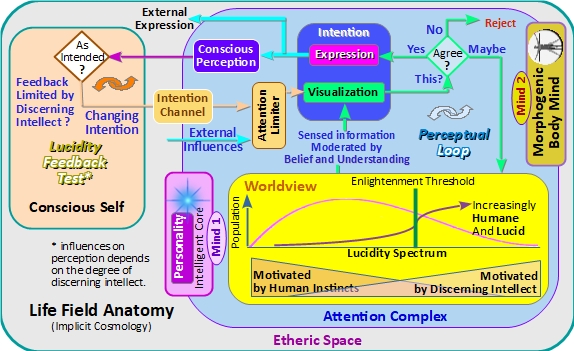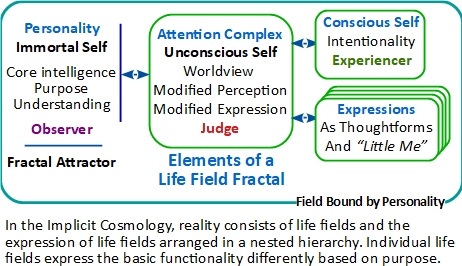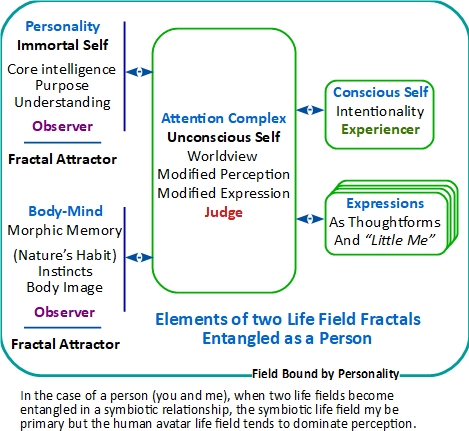
Opinion 18
Abstract
The Survival Hypothesis holds that the mind aspect of who we are continues after bodily death. The two contending versions are the survival of memory commonly referred to as the Super-Psi Hypothesis, and what I think of as the Strict Survival Hypothesis that holds our mind continues to exist after bodily death in a self-aware, sentient form.
Much of the problem in conceptualizing survival appears to be in the way a person is modeled. Typically, it appears that people think of a person as a single being, part of which survives and part of which dies. This essay describes a two-personality model for a person. That is, a person is an etheric personality entangled in a symbiotic relationship with a human avatar.
Introduction
A discussion of the various “proofs” for the Survival Hypothesis is in the Trans-Survival Hypothesis (1) essay. The essay is named with a “trans-“ prefix to avoid confusion with more mainstream explanations which typically do not account for Instrumental TransCommunication (ITC).
Terms to Remember
Discerning Intellect — This is a term often encountered in Eastern systems of belief. It is a term used to indicate conscious evaluation of information based on informed judgment rather than “knee-jerk” reactions based on instincts. The 4,000-year-old Katha Upanishad explains this concept best:
The material quoted here is from the Vedanta Spiritual Library: (2)
1-III-3. Know the Self to be the master of the chariot, and the body to be the chariot. Know the intellect to be the charioteer, and the mind to be the reins.
1-III-4. The senses they speak of as the horses; the objects within their view, the way. When the Self is yoked with the mind and the senses, the wise call It the enjoyer.
1-III-5. But whoso is devoid of discrimination and is possessed of a mind ever uncollected – his senses are uncontrollable like the vicious horses of a driver.
1-III-6. But whoso is discriminative and possessed of a mind ever collected – his senses are controllable like the good horses of a driver.
1-III-7. But whoso is devoid of a discriminating intellect, possessed of an unrestrained mind and is ever impure, does not attain that goal, but goes to samsara.*
1-III-8. But whoso is possessed of a discriminating intellect and a restrained mind, and is ever pure, attains that goal from which he is not born again.
1-III-9. But the man who has a discriminating intellect** as his driver, and a controlled-mind as the reins, reaches the end of the path – that supreme state of Vishnu.***
* Samsara is Hindu for the cycle of death and rebirth as life is bound to the material world.
** I teach the value of developing lucidity, an indicator of which is increasing discernment. To be consistent, I say “discerning intellect” rather than “discriminating intellect” as used in the Katha Upanishad.
*** Supreme state of Vishnu refers to self-realization or self-knowledge.
Etheric – An old term used to denote the greater reality. It is not heaven but a conceptual space consisting of life fields and their expressions. (3) In this view, the physical universe is an aspect of the etheric. In effect, the physical is thought to be a collective expression based on a consensus of interested life fields.
Psi Field Hypothesis – In the Psi Field Hypothesis, the expression of mind (thought), more correctly the influence of thought, is known as “Psi.” Also, that a nonphysical field permeates the physical and supports the propagation of Psi.
Super-Psi Hypothesis – A metaphysical model that holds that mind is a product of brain, and that the energy of mind (physical energy in the Psi Field according to Super-Psi) remains after bodily death in a psychically accessible form. The point of the hypothesis is that all psychically accessed information, including mediumistically acquired information, are anchored in the physical. When a person dies, all that remain is residual energy of their thoughts.
Survival Hypothesis – The argument that mind exists independent of biological brain, and that the brain functions as a transmitter of physically sense information to etheric mind and a receiver of body movement commands from etheric mind to the body. In this model, the relatively immortal personality continues after physical death as a sentient, self-aware life field.
Physicalism – The metaphysical view that the universe is all there is. This means mind must be produced by the brain, and when the brain dies, so does mind.
Dualism – The metaphysical view that mind exists separate from biological brain. This leads to a model in which there is a nonphysical aspect of reality that supports mental processes and an aspect which we think of as physical.
Physical Dualism – The metaphysical view that, with the addition of a Psi Field, Physicalism is essentially correct. Physical Dualism supports the Super-Psi Hypothesis.
Strict Dualism – The metaphysical view that the physical universe is an aspect of the etheric. This dual physical-etheric nature is a prerequisite for the Survival Hypothesis, in that it is the etheric personality that continues after physical death.
Fractal – A fundamental shape, which is repeated, often in a nested hierarchy of the same shape. A common, conceptual set of characteristics may be modeled as a fractal.
Entanglement – A term describing closely associated physical and/or conceptual objects behaving as if they were one. It is necessary to define this common term to make it clear that I am not referring to quantum entanglement. Quantum physicists properly used the literal sense of the term to define an observed effect, However, the fact that there are a few similar characteristics between quantum particles and mind-body relationships does not mean they are all quantum in nature.
Comparisons between consciousness and quantum effects appear to be intended to show that mind is a product of brain (Physicalism).
A Person
The Strict Dualist point of view holds that a person is an etheric personality entangled with a human in an avatar relationship for the lifetime of the human. In this regard, you might hear people say they are “spirit having a human experience” or “I am more than my body.” In this model, the etheric personality represents the primary “I think I am this” aspect of a person. The etheric personality is modeled as being relatively long-lived.
In this model, the human’s Body-Mind acts as the secondary or avatar personality of the person. Entanglement is thought to occur in the person’s mostly unconscious worldview (Judge) and conscious self (I think I am this, Observer) functional areas. Worldview consists of inherited human survival instincts, inherited etheric personality’s discerning intellect, memory and cultural indoctrination. The human’s instincts dominate perception and decision making from birth. One of the objectives of a seeker after self-realization is to learn to manage the influence of survival instincts with discerning intellect.
Consider the two diagrams below. In the Implicit Cosmology, (4) reality is modeled as a core intelligence, functioning as a Source of First Cause expressing curiosity “via aspects of itself (you and me) and receiving understanding from those aspects.
Think of the Source core intelligence as the top fractal. The Mandelbrot Set discussed in The Cosmology of Imaginary Space (5) provides a useful analog showing how the top fractal is replicated an infinite number of times within its domain. In effect, the top life field is the reality field and we are fractals of that source which are aspects of the top fractal and within its field of influence. Remember that all of this is conceptual and “within” is more like a thought within a thought than a person standing in a room.

Our human is also a life fractal, but with different lines of evolution. That means it is probably able to function without entanglement with our etheric personality.
The Elements of Two Life Field Entangled as a Person Diagram (below) illustrates how two life fields are thought to entangle during the lifetime of the shortest-lived life field.

Purpose
When considering the “Why” of our entanglement with our human avatar, the most commonly cited purpose is for us, as the visiting personality to this physical venue, to gain understanding about how the organizing principles manifest in the physical venue. According to this model, the prim imperative of an etheric life field is to return understanding to the collective. This collective understanding shares characteristics with the “Nature’s Habit” database described in Sheldrake’s Hypothesis of Formative Causation (aka Morphic Resonance) (6)
Contending Models
The two contending hypotheses are the Physicalist view that mind is produced by the brain and ceases to exist after biological death. What I refer to as Physical Dualism holds that mind is the product of brain but that the nonphysical energy of mind is psychically accessible and continues to exist after bodily death. That is, survival is in the form of other people’s memory of the person and a sort of residual energy that continues to exist in the Psi Field, and which is accessible via psychic functioning.
Neither the Physicalist nor the Physical-Dualist points of view effectively address the evidence of ITC. The Strict Dualist model I refer to as the Implicit Cosmology has been shown to reasonably address what is currently known about Psi phenomena.
References
- Butler, Tom. “Trans-Survival Hypothesis.” Etheric Studies. 2015. ethericstudies.org/trans-survival-hypothesis/
- (Translator) Panoli, Vidyavachaspati V. “Katha Upanishad.” Vedanta Shastras Library. shastras.com/upanishads-krishna-yajur-veda/katha-upanishad/
- Butler, Tom. “Life Field.” Etheric Studies. 2014. ethericstudies.org/life-field/
- Butler, Tom. “Implicit Cosmology.” Etheric Studies. 2015. ethericstudies.org/implicit-cosmology/
- Butler, Tom. “The Cosmology of Imaginary Space.” Etheric Studies. 2014. ethericstudies.org/cosmology-imaginary-space/
- Sheldrake, Rupert PhD. “Morphic Resonance and Morphic Fields.” Rupert Sheldrake. [Online] sheldrake.org/research/morphic-resonance/introduction?
![]()

Fascinating, “an etheric personality entangled with a human in an avatar relationship for the lifetime of the human” really resonates, as does the suggestion that one needs to transcend human instincts to achieve self realisation. I would love to learn more about how this can be achieved.
Thanks for the comment Melanie.
The definition of a person as a personality entangled with a human avatar is just a different way of stating what Spiritualists and spiritual teachers have been saying all along. The reason I am excited about this approach is that it emphasizes the “so what” implications of survival in relatable terms. If we survive, what of us survives and what of our faithful body?
I talk a lot about lucidity which is a state of attention-intention that manifests as discerning intellect. A pretty good essay is “Becoming Lucid” at https://ethericstudies.org/becoming-lucid/
As a teacher, I would advise making a decision to examine assumptions with the intention of aligning them with the actual nature of reality. In practice, none of us know the actual, so we must converge on understanding the actual through habitually, consciously expressing the intention to ourselves to examination why we are make choices. It takes practice, so the rest of the story is patience.
It usually is not useful to make a resolution and expect change. One must do the work and it is work of a lifetime … just like learning new skills. Daily choices such as to have dinner or not should be between you and your human. I am talking about philosophical, opinion-intensive choices such as liking something or making a political choice–decisions that involve the nature of your world.
As I say on my website, the objective is to “Believe what you wish but understand the implications of what you believe.”
So deciding to live in accordance with reality is the first step. The second is turning that decision into a habitual way of thinking. We are born pretty much as a mindless symbiont. It is for us to live the lifetime while honoring our humanness as we urge our etheric self to pay attention … take up the rains of our chariot houses, so to speak. Instincts must be moderated with reason.
For me, I will have lived a good life if I have gains a degree of spiritual maturity while maintaining a compassionate human.